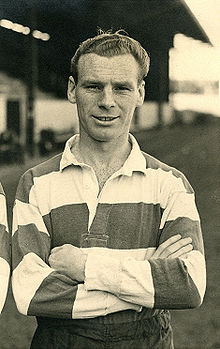Joe Mallett
 |
|||
| Personal information | |||
|---|---|---|---|
| Full name | Joseph Mallett | ||
| Date of birth | 8 January 1916 | ||
| Place of birth | Gateshead, England | ||
| Date of death | 8 February 2004 (aged 88) | ||
| Place of death | Hastings, England | ||
| Height | 5 ft 7 in (1.70 m) | ||
| Playing position | Wing half | ||
| Youth career | |||
| Dunston Colliery | |||
| Senior career* | |||
| Years | Team | Apps | (Gls) |
| 1935–1939 | Charlton Athletic | 2 | (0) |
| 1937–1938 | → QPR (loan) | 29 | (4) |
| 1939–1947 | QPR | 41 | (7) |
| 1947–1953 | Southampton | 215 | (3) |
| 1953–1955 | Leyton Orient | 27 | (1) |
| Teams managed | |||
| 1964–1965 | Birmingham City | ||
| 1970–1973 | Panionios | ||
| 1973–1974 | Apollon Athens | ||
| 1982 | San Jose Earthquakes | ||
| * Senior club appearances and goals counted for the domestic league only. |
|||
Joseph "Joe" Mallett (8 January 1916 – 8 February 2004) was an English professional footballer who spent much of his early playing career at Queens Park Rangers and subsequently at Southampton (playing as a wing half). He later became a coach, manager and scout.
Born in Gateshead, Mallett was spotted playing for the Dunston Colliery works team by a London scout, and was signed at the age of seventeen by Charlton Athletic to serve his apprenticeship under manager Jimmy Seed. He had not made any first team appearances before Charlton (then in the First Division) loaned him to Third Division South team Queens Park Rangers to gain experience in April 1937. He remained at QPR until May 1938, making 31 appearances before returning to Charlton, where he appeared twice in the 1938–39 season. In February 1939 Rangers persuaded Charlton to sell him; he was becoming a first-team regular at QPR before his career was interrupted by conscription into the RAF in World War II. During the war he guested for Fulham and West Ham, returning to QPR after the cessation of hostilities.
In February 1947 Bill Dodgin signed him for Southampton for a club record £5000. Although now aged 31, Mallett proved to be a bargain purchase – he was "a strong link between the defence and attack, and was particularly sound in his positional play." He made his debut away to Plymouth Argyle on 1 March 1947, scoring one of Saints' goals and making the other in a 3–2 defeat. He soon became the team's captain and had "forthright views on how the game should be played". Teammate Alf Ramsey described him as "having one of the finest of all soccer brains".
...
Wikipedia
